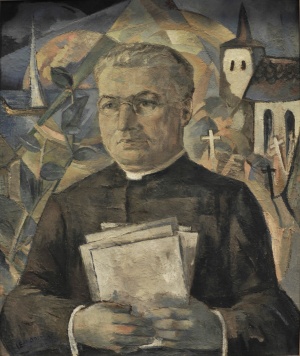Cobbenhagen
Martinus Joseph Hubertus Cobbenhagen (1893- 1954) was Rector Magnificus of the Tilburg Roman Catholic Business School in the periods 1932-1933, 1937-1938 and 1945-1946. For his dedication to the institution’s administration and his interest in student life and alumni, he gained for himself the reputation of being “father of the College community.” He continues to enjoy the reputation of being the founding father of Tilburg University for his efforts to connect economics and ethics, for the importance he attached to aspects of philosophy and for his teaching manual including philosophy as a compulsory subject.
Corporate accountabiliy
Cobbenhagen was born in Gulpen and, having passed through the Rolduc minor seminary, was ordained to the priesthood in 1917. He graduated from the College for Commercial Trade in Rotterdam in 1921, where he also obtained his doctoral degree in 1927 with a thesis entitled Corporate Accountability. In that very same year, he was appointed Professor at the newly established Roman Catholic Business School in Tilburg. In the Inter-War period, Cobbenhagen was one of the vehicles of Catholic socio-economic ideas as inspired by the papal encyclical Quadragesimo Anno from 1931. In those times of crisis, poverty and unemployment after the Wall Street Crash of 1929, social justice became a prominent theme, which led Cobbenhagen to hold up solidarity rather than pure individualistic capitalism or state capitalism as a principle of the socio-economic order.
Advancing society
Cobbenhagen was very influential in the new College’s development. He was an advocate of having a scientific program that served the practice of socio-economic life and considered economics an intermediate science, a middle ground between physics and the humanities. Quantitative and model-based methodologies must be used, in his view, but ought not to be the core of science. In addition, Cobbenhagen felt, the science of economics should be organically connected with other disciplines, such as sociology and psychology; in isolation, the science of economics would only serve to further the causes of human materialism and the mechanization of life. In 1934, he was the initiator of TAEK, the first alumni society, and in 1935 he was the co-founder of Economics, the Tilburg economic journal, whose editor he remained until his death. This journal dedicated a great many of its pages to issues of socio-economic principle.
World War II
In the Second World War, Cobbenhagen was imprisoned as a hostage because of the College’s dismissive attitude towards the German occupier. After the War, he became chairman of the Property Distribution Committee. He became chairman of the Community Work Foundation, providing help to socially disadvantaged families in Tilburg. In 1947, he was honored to be appointed Secret Papal Chamberlain. The University’s oldest building was named after Cobbenhagen, just like the Tilburg Cobbenhagen Center, which aims to explore the significance of this founding father for the contemporary academic context and society.
Painting from 1956, by Jean Adams

